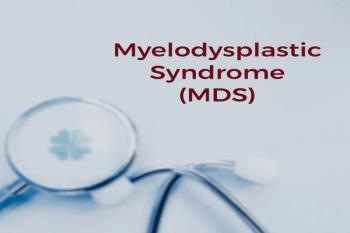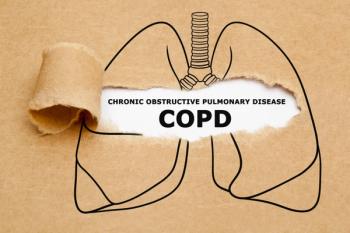
A high burden of HIV could indicate other underlying factors, such as limited access to health care resources and a risk of major depressive disorder.

A high burden of HIV could indicate other underlying factors, such as limited access to health care resources and a risk of major depressive disorder.

Investigators of a retrospective study encourage colleagues to utilize molecular testing for patients with an established diagnosis of lower-risk myelodysplastic syndromes (MDS), to be sure they don’t miss out on treatments, like luspatercept, for which they qualify.

Outcomes among patients with stage IV non–small cell lung cancer as evaluated within clinical trials via Response Evaluation Criteria in Solid Tumors (RECIST) and clinician response criteria in observational studies were compared for their concordance and reliability.

The findings show exercise-induced hypertension increases myocardial oxygen demand.

A study found significant incidence of advanced neoplasia in patients who had a colonoscopy to screen for colorectal cancer (CRC) when aged more than 75 years.

Density loss in the optic nerve head capillary could lead to a faster rate of visual field progression as well as an increased risk of developing event progression.

In patients living with HIV, the cardiovascular risk factors that come with infection may lead to an increased prevalence of coronary artery stenosis, especially in those who also have hemophilia.

A prospective study found evidence of serum neurofilament light (sNfL) level increases in patients affected by active forms of relapsing-remitting multiple sclerosis (RRMS); however, these findings were not significant enough to suggest sNfL measurements replace clinical or MRI monitoring of disease activity.

The Joint Commission is launching the Rural Health Clinic Accreditation Program to standardize staff training and patient care practices at rural health clinics nationwide; the American Cancer Society recently launched the largest-ever study of cancer risk and outcomes in Black women; the HHS COVID-19 vaccination campaign saved $732 billion by preventing illness and related costs.

A very unusual case of 2 chronic leukemias, chronic lymphocytic leukemia (CLL) and secondary chronic myeloid leukemia (CML) existing simultaneously in an older patient was treated with a pair of targeted kinase inhibitors.

There is an extremely low rate of chronic obstructive pulmonary disease (COPD) diagnoses in Japan, particularly among patients with airflow obstruction, despite regular respiratory function tests.

A CMS official discusses a draft guidance on the second round of drug pricing negotiations amid uncertainties over the first round of talks under the Inflation Reduction Act (IRA).

Physicians treated the patient without surgery, although they said the patient’s case is particularly challenging and treatment was ongoing at the time of the report’s writing.

A Mendelian randomization study using genetic analysis found that alopecia areata (AA) increases the risk of anxiety and depression, but not the other way around, providing unique evidence for a causal link while adding to existing evidence.

Fifty percent of US rural hospitals are facing financial problems; US lawmakers have called out the corporate spending of 3 large nursing home companies; hospice patients under Medicare Advantage are now facing uncertainty after the government ended its pilot program.

Innovation in the specialty pipeline, drug costs, health care policy updates, and collaboration were key topics at this year's Asembia Specialty Pharmacy Summit.

During her session, Polina Reyblat, MD, Kaiser Permanente Los Angeles Medical Center, highlighted best practices urologists should incorporate to make transgender and gender-diverse patients comfortable during physical exams and avoid retraumatization.

The Medicare trust fund is now expected to deplete in 2036, with the Inflation Reduction Act being credited for at least some of the extension.

A secondary analysis investigating the efficacy of a digital, interactive cognitive behavioral therapy program for insomnia (CBTi) demonstrated the positive impacts of the program for patients with insomnia or a high risk of co-morbid insomnia and sleep apnea (COMISA).

Stephanie T. Page, MD, PhD, UW Medicine Diabetes Institute, presented on ongoing research and growing interest in new male contraceptive options, such as an oral pill and a hormonal transdermal gel, at the American Urological Association 2024 Annual Meeting.

In 2024, the Asembia Specialty Pharmacy Summit celebrated 20 years and speakers highlighted the conversations around improving access and affordability taking place at the meeting.

Survey results from more than 1500 patients with diabetes revealed that 57% believed glucagon-like peptide-1 (GLP-1) weight loss drugs alone could be a "silver bullet" for managing their health goals.

Disparities in health care systems around the world limit access to effective treatments for advanced breast cancer, especially for people in low- and middle-income countries and marginalized communities. Stronger health systems and social education efforts are necessary to improve outcomes for all patients.

In part 2 of our interview with Binod Dhakal, MD, he addresses how CARTITUDE-4 study findings help to advance the clinical understanding of ciltacabtagene autoleucel (cilta-cel) and the importance of vigilance and education on the treatment’s adverse effects.

The Senate Finance Committee has introduced bipartisan legislation that proposes using Medicaid and Medicare programs to help prevent and reduce generic drug shortages; US indicators for COVID-19, flu, and respiratory syncytial virus (RSV) declined further last week; findings from a recent study reveal growing disparities in child death rates across racial and ethnic groups.

Dr William R Short discusses how clinical trials and treatment by a doctor should change with new treatment available and needed.

The novel intravesical drug delivery system releases erdafitinib locally within the bladder while limiting systemic toxicities.

Quoc-Dien Trinh, MD, MBA, chief of urology at Brigham & Women's Faulkner Hospital, highlighted successful efforts to improve prostate cancer care access for underserved communities in Massachusetts.

According to a review, recent progress offers hope in the form of treatments, such as combination therapy that utilizes surgical and nonsurgical methods, for individuals with facial acne scars.

Updated findings from SunRISe-1 also showed that all but 1 responder achieved complete response within 12 weeks of treatment with the targeted gemcitabine delivery system.

259 Prospect Plains Rd, Bldg H
Cranbury, NJ 08512
© 2025 MJH Life Sciences®
All rights reserved.
